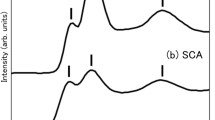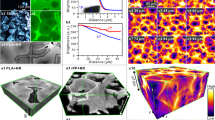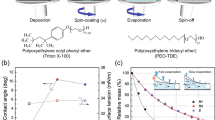Abstract
Barnes, Burton and Scott1 have described a modified polystyrene–silica replica technique for the study of organic surfaces ; but owing to the high temperatures (130° C.) involved in the formation of the intermediate replica, their method is unsuitable for water-containing substances. They suggest, however, that some plastics such as isobutyl-methacrylate are sufficiently thermoplastic at temperatures below 100° C. to give the necessary resolution without total drying of the specimen.
This is a preview of subscription content, access via your institution
Access options
Subscribe to this journal
Receive 51 print issues and online access
$199.00 per year
only $3.90 per issue
Buy this article
- Purchase on Springer Link
- Instant access to full article PDF
Prices may be subject to local taxes which are calculated during checkout
Similar content being viewed by others
References
Barnes, R. B., Burton, C. J., and Scott, R. C., J. Appl. Phys., 16, 730 (1945).
Heidenreich, R. D., and Peck, V., J. Appl. Phys., 14, 23 (1943).
Heidenreich, R. D., and Matheson, L. A., J. Appl. Phys., 15, 423 (1944).
Author information
Authors and Affiliations
Rights and permissions
About this article
Cite this article
BROWN, A., JONES, W. A Methyl Methacrylate–Silica Replica Technique for Electron Microscopy. Nature 159, 635–636 (1947). https://doi.org/10.1038/159635a0
Issue Date:
DOI: https://doi.org/10.1038/159635a0
This article is cited by
-
Elektronenmikroskopische Oberfl�chenabdr�cke und ihr Aufl�sungsverm�gen
Die Naturwissenschaften (1966)
-
Elektronenmikroskopische Untersuchungen an fixierten und lebenden Mikroorganismen unter Anwendung der Abdruckverfahren
Zeitschrift für Hygiene und Infektionskrankheiten (1955)
-
Elektronenmikroskopische Untersuchungen an lebenden Bakterien mit Hilfe des Abdruckverfahrens
Experientia (1955)
-
Bau und zusammensetzung der larvencuticula von Hypoderma bovis (oestridae)
Zeitschrift f�r Morphologie und �kologie der Tiere (1954)
-
Elektronenmikroskopische Untersuchungen über den Bau der Hoftüpfel
Holz als Roh- und Werkstoff (1952)
Comments
By submitting a comment you agree to abide by our Terms and Community Guidelines. If you find something abusive or that does not comply with our terms or guidelines please flag it as inappropriate.



